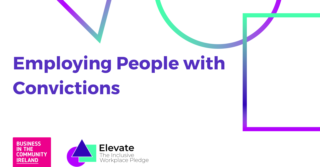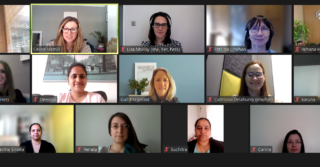Accenture Ireland Mental Health Ally Programme
Following the recent publication of the Inclusive Employer blueprint, this is the first in a regular series of articles containing business tips and examples of Inclusion in Action.
In 2018 Accenture Ireland developed a Mental Health Ally programme as part of a wider commitment to becoming a truly inclusive organisation. Through this initiative, Accenture are fostering a workplace that promotes wellbeing, tackles work-related mental health problems and supports staff experiencing distress, and creates an environment in which employees want to work and in which they can perform well.
Background: Name the issue
“1 in 4“ is the figure widely quoted in the media for the incidence of mental ill health. In the UK and in Ireland this figure originates from the 2007 Adult Psychiatric Morbidity Survey. It established that 23 percent of adults had a treated or untreated mental health condition.
Accenture recently conducted a survey[1] of 2170 working men and women to understand more about how mental health touches peoples’ lives. 66 percent of the employees who participated in our survey reported having personally experienced mental health challenges. 85 percent said someone close to them had experienced a mental health challenge. Overall, 9 in 10 people who participated in our survey had been touched by mental health challenges in some way. Among Millennials, that figure rose to 93 percent.
Mental Health is ‘a state of well-being in which every individual realizes his or her own potential, can cope with the normal stresses of life, can work productively and fruitfully, and is able to make a contribution to her or his community.’ Source: World Health Organisation (WHO).
What was the imperative/rationale for action?
At Accenture we want to ensure every employee feels that they can talk confidentially to their line manager, colleague or HR about a mental health concern and get the support they need. The Mental Health Ally Programme is a key initiative designed to achieve this goal by providing training to Accenture people in order for them to become Mental Health Allies. Further than this, it demonstrates our commitment to becoming a truly human and inclusive organisation.
The initiative: Describe what you did, the steps you took to address the issue.
- Firstly, we assessed the workforce appetite with a short 10-minute presentation followed by discussions around stress management and healthy tips.
- Next, we got Leadership buy-in. At Accenture our leadership team backed up the program while it was still in its infancy. Their support has been critical to the success of this initiative.
- We then launched the initiative to all employees via internal social media. The content included long and short form posts and mini competitions around sharing healthy habits and wellbeing podcasts. All content was guided by Accenture’s holistic health and wellbeing programme that incorporates physical and mental health and focuses on awareness and prevention. Opening the dialogue and normalising the mental health discussions, set the scene to encourage employees to tell their own stories. These authentic personal stories were a catalyst for the creation of the Mental Health Ally training.
- We then contacted Irish charities such as See Change, Mental Aid First Aid and Aware, who supported us in the creation of the programme.
What were the results, the impact delivered? What were the intended and unintended benefits? What challenges did you experience?
To date Accenture Ireland has trained more than 200 allies and has a similar number scheduled for training in the upcoming month. Through this initiative, we are fostering a workplace that promotes wellbeing, tackles work-related mental health problems and supports staff who are experiencing distress, and creates an environment in which employees want to work and in which they can perform well.
Following the success of the Mental Health Ally Program in Ireland, other countries around the globe implemented the program and we now have a global network of 27 countries.
What can other companies learn from this? What were the key drivers to success? If starting again, what would you do differently?
- Make it about everyone. Engage all levels of the workforce
- Let’s talk. Demonstrate to employees that senior executives are engaged on the topic of mental health, while increasing awareness of its importance.
Adopt mental health standards.
The Stevenson-Farmer Review sets out six standards for employers, covering everything from culture to the provision of practical and medical support and offers guidance on how the standard might be implemented.
“We believe that positive mental health is an essential part in sustaining high performance and maintaining wellbeing and balance in our lives. The Mental Health Ally programme reflects our commitment to fostering the positive mental health of our colleagues and reflects our experiences of how difficult it can be to balance the competing demands of clients, family, Accenture and caring for ourselves.” Danny Kavanagh, Managing Director and Accenture Ireland Sponsor for Mental Health.
Visit our sustainability areas of expertise to see how we help businesses on diversity & inclusion in the workplace.
Call out to Business
Do you have examples of initiatives in your business that have helped build an inclusive culture? If so we’d love to hear from you. Contact losullivan@bitc.ie to share your experiences and inspire others to action.
Upcoming Network activities related to the Inclusive Employer:
- Customised presentations to interested companies
- Event: Round-table discussion with member companies on the topic of employment and retention of people with disabilities.
If you would like further information on how to build an inclusive culture contact losullivan@bitc.ie
Tags:







